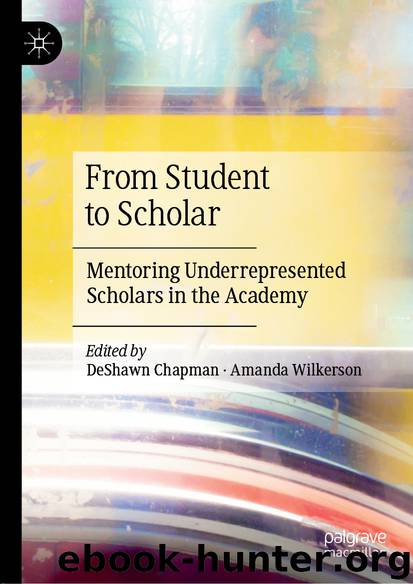From Student to Scholar by Unknown

Author:Unknown
Language: eng
Format: epub
ISBN: 9783030420819
Publisher: Springer International Publishing
Objectives and Needs of Minority Students in Academia
Throughout the sharing of my lived experiences, I have reflected on how much more difficult it would have been to enhance my networking at the college of education and beyond had I not had the support of my mentor in my socialization. Moreover, her assistance in helping me understand the new research-academic culture, for which I existed in, opened my eyes to the need to rely on the help of the more knowledgeable, in this case, represented by her, my supervisor and mentor, as well as other recognized faculty at the college and university. The crucial importance of networking also gained renewed attention. Connecting with people in my area of expertise, both in higher hierarchical levels or among peers, has always been important, as well as an everyday activity carried out since the days of studying and teaching. In academia, however, it acquired relevance because a successful networking process, within the correct group and setting, can become fundamental for the desired job within academia.
During the time of my studies and our work together, my supervisor’s offer of clear guidance and protection constituted a safe frame within which to operate. This became especially important when the time came to start applying for my first academic job posts. One day my mentor came to the office with what she explained was a surprise for me. It was a document with an excel chart that had been previously passed to her by her supervisor. “This chart was created by my supervisor at graduate school,” she explained. “She had created it to annotate all of her applications to job posts,” she added. The chart was a great example of a well-organized job search, including annotations of the job posts applied to, the interviews conducted, the campuses visited, and the job positions offers received. The application of this model proved to be valuable in my own experience, as well. Among these multiple benefits, the mentoring relationship constituted a role model to imitate in the future, and I know today that the best way to thank her would be by “passing it over” as she used to say, as she had personally done.
Despite the positive experience and efforts to keep the mentoring association and its benefits, I found it hard to keep a fluid relationship after graduation. However, the need for mentoring continues to be fundamental for newly graduated doctoral students, and mainly for minority, international students. After doctoral studies, it is expected that the previous mentor–mentee relationship, based on a supervisor–supervisee, professor–student relationship, changes, and adapts itself to a new reality. Even though mentorship had supported me in the previous stage as a doctoral student, I had to realize the paths my mentor, and I needed to follow were quite different after graduation. Whereas her demands as an assistant professor continued being the same as described before, my needs as a novice adjunct employee had changed completely. I understood it as a natural development that our mentor–mentee relationship had to change.
Download
This site does not store any files on its server. We only index and link to content provided by other sites. Please contact the content providers to delete copyright contents if any and email us, we'll remove relevant links or contents immediately.
Becoming by Michelle Obama(9292)
The Last Black Unicorn by Tiffany Haddish(5075)
Beartown by Fredrik Backman(4419)
Man's Search for Meaning by Viktor Frankl(3634)
The Book of Joy by Dalai Lama(3218)
In a Sunburned Country by Bill Bryson(2948)
The Choice by Edith Eva Eger(2897)
The Five People You Meet in Heaven by Mitch Albom(2843)
Full Circle by Michael Palin(2771)
The Mamba Mentality by Kobe Bryant(2669)
The Social Psychology of Inequality by Unknown(2311)
Book of Life by Deborah Harkness(2263)
The Checklist Manifesto by Atul Gawande(2204)
Less by Andrew Sean Greer(2188)
The Big Twitch by Sean Dooley(2044)
No Room for Small Dreams by Shimon Peres(1991)
A Burst of Light by Audre Lorde(1981)
No Ashes in the Fire by Darnell L Moore(1981)
Imagine Me by Tahereh Mafi(1921)
